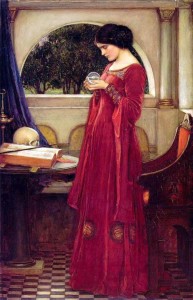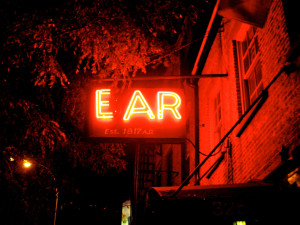Dear Reader,
I want to ask you, to beg you, really, to tell the story you don’t want to tell. To stop denying, stop robbing yourself and the rest of us of the story that moved you, showed you a peek at a mysterious working of the world. I’m asking you to stop being afraid of the judgments—social and self-inflicted–and tell the story. I’m talking about the extraordinary story.
What’s that, you say? You’re not familiar with the extraordinary story? Lend me your ear, and the rest of your perception, and I’ll tell you: an extraordinary story is about a moment you witness that defies all current logic about our senses. It is a story about a voice you hear, a vision you see, a force you feel.
An extraordinary moment is not a psychotic moment. Neither is it super-human. An extraordinary moment is a puzzle of consciousness on its way to being solved in the scientific world. It is called an exceptional experience, an anomalous experience, a non-local experience. The hardest, most rigorous minds across disciplines from physics to psychology agree: the exact mechanics of an extraordinary experience are not understood. How we can, on occasion, feel a family member is calling us from a distance moments before they die. Or how we can find a lost cat, or a lost child, because we get a picture in our mind of their remote location under a cliff’s edge. The extraordinary moment is marginal not because it’s been studied and rendered meaningless, but because it hasn’t been studied enough.
In this age of brain scans and neuroscience, understanding what makes an extraordinary moment occur in nearly 50 % of the population in Western Countries seems imminent. Fifty years ago, our philosophers looked outward to the wonders of the universe, only to be led inward to the wonders of the amygdala. We founded NASA then, and we explore neurotransmitters now. The science will happen, Dear Reader. Case in point: you have status updates about a chum’s pumpkin-brandy nut loaf in the palm of your hand. Do you really doubt if you’ll ever understand how and why we can dream of earthquakes before they occur, or hear the words of our loved one before they spill from their lips? Or, do you prefer to doubt those moments because doing so saves you from telling the uncertain story?
~
To me, this is the problem. To me, more important than the science is the story. To me, the extraordinary moment and what we do after is a cornerstone of narrative, hidden by weeds of fear, confusion, denial, exploitation, and appropriation by every charismatic leader and religious sect that ever lived. Even when science reveals the true nature of these events (like this meta analysis on premonition does), we, the people, the inheritors and progenitors of story, will still hedge when it comes to the extraordinary. Unless we take narrative action, we will still hide. I am asking you, reader, to save yourself and the rest of us, from this needless worry, shame, judgment and limitation. Open your eyes, your ears, and your minds.
I’m prone to extraordinary moments, reader. The technical term for a person like me is a High Frequency Responder: I notice and remember and even attract synchronicities, hard-to-explain chance meetings at airports, and sometimes have strong, accurate feelings about future events without good reason. Half the time these moments are small and forgettable. The other half they change my behavior and decision-making. The sheer number of them fuels my sense that they are an important but yet to be understood aspect to our human communication.
But when I tell these stories, the responses from others are similar and non-engaged. “Those things only happen to you,” or “That’s not normal,” or “How unlikely,” or “You must be psychic,” or “You must be special,” or “You must be crazy.”
When I tell these stories, people want a way to affirm the otherness. They want the secure feeling that such a thing would never happen to them, or force them to behave against reason. They want an ending to the story that they can link back to causes like true love or God’s grace or some convenient outside entity. But the truth is, I don’t have those endings. The endings I have, and the endings of many extraordinary stories, lead back to you and me, and who we are. They affirm our true nature as complicated, deeply connected people, scared of our own possibilities.
~
Here’s an example:
When I was 19, I needed a haircut. Usually I got just a regular cut, but this time I wanted one with a little edge. I had heard particular razor-friendly East Village establishments did free demo days back in 1990, so I scoured the Village Voice, turning inky page after inky page, looking for the demo day alert.
I scanned music listings, restaurant reviews, and sex pages. The paper was thick and chaotic; there was no telling where a salon ad might pop up. I got lost in the graphics, the headlines, the layout. My mind wandered, then drifted, then landed on a memory of a conversation I had the previous Saturday.
I had gone with a friend to see George Clinton of Parliament perform at the Palladium. The dark venue glowed in ambient blue light, and I milled about the cave with heightened senses. A conversation between a guy, whose face I could not see, and a bartender caught my attention. The guy spoke of an upcoming trip to St. Croix, an island I had recently learned was rife with social unrest. In a moment of boldness, I interrupted. “St Croix is a horrible island. It’s very racist and sexist, the people chain their horses and starve their dogs.”
Of the many impulsive things I have said in social situations, this was among the most ridiculous. I was still queasy three days later just thinking about the outburst and the embarrassment that followed; the silent stares, the thump of my ego falling flat. I wasn’t going to find a boyfriend any sooner than I was going to find my haircut. Note to all single girls: to share negative hearsay without humor is not an ideal icebreaker. I slunk away unnoticed.
Or so I thought. The very moment I remembered this incident, I turned to last page of the Village Voice and scanned the personal ads. My eyes stopped.
“We met at the bar at George Clinton. St Croix is racist and sexist. Please call.”
The words flew at my face. They were sandwiched between an announcement for an NYU drug study and a recovering addict’s ‘Thank You St. Jude’
There had been no conversation with this faceless fellow. There had been no exchange of information, no knowing glances, winks or smiles, no follow up chat and certainly no drinks. I stared at that phone number in the way you do when served sweetbreads: tempted and terrified.
An extraordinary experience feels rather eerie: one can stop your breathing, advance your heart rate, raise your temperature and even trigger the vagus nerve, leaving you in a heap. It might make you feel faint or exhilarated or just confused. It might feel so intimate you might wonder if your inner thoughts are known by some other intelligent force, besides you.
My friend put it plainly. “He put an ad out for you. And you saw it. Maybe he loves you. You have to call.”
~
It was a 718 area code in the days you only wanted to dial 212. 718 were my relatives in the Bronx. 718 housed all towed cars. But thoughts of love changed my mind. I forgot all about the haircut and called.
A woman answered—older, hard, harried. His mother.
“Joseph, you have a call. I don’t know. A young woman.”
We struggled through a conversation. He had a thin and harmless voice. We didn’t talk much about the fact that he put an ad in the paper for me, and that I saw it. We skipped right over that anomaly. But it was there behind the conversation. I learned his age was 26 and his profession was graphic designer/ice cream truck driver. I learned by mid-chat that we were both too nervous to make any kind of a good impression. I wanted to hang up and forget it ever happened.
And yet, when he asked if I wanted to meet, I said yes. I see this now as a youthful mistake, a lack of confidence in the world of romance. But I also see it as a mistake people make when extraordinary incidents occur.
~
Reader, I understand how much you may want these incidents to mean something specific — that love or luck or happiness is guaranteed at the end of their occurrence. I wanted that, too. I didn’t want to believe that unconscious communication crosses space and time, without any dramatic reward. I wanted a dramatic reward! I was of the mind, why do anything if not for dramatic reward?
But the dirty secret is this: unconscious communication across space and time occurs on a regular basis. The Global Consciousness Project has been measuring the synchronistic connection of our “random” thoughts since Lady Di was killed. The data, culled over 14 years by a retired Princeton scientist who planted Random Number Generators across the world, is buried in academic inquiry. It remains lost with other statistically massive evidence from Jessica Utts and Rhea White that extraordinary experiences do happen, do defy our sense of logic and science, and do suggest that people are much more interconnected than mainstream science can explain. But here’s the thing: just because we are extraordinarily connected does not guarantee meaningful reward at the end of each connection. Were it not for this deep-rooted cultural confusion, I’d have acted differently. We both would have.
Instead, when the night came I chickened out. I didn’t even call to cancel. In books and films I liked the idea of unconscious connection and synchronicity, because it seemed to point to being on the right path. In Jane Eyre, Jane hears Rochester call to her across a great distance, and runs to him whole-heartedly. In Star Wars, Luke randomly buys the broken little droid R2D2, only to find the cry for help from Princess Leah embedded inside — a sign to join the revolution. In all of our beloved narratives, extraordinary moments are meaningful turning points that open doors, connect us to others, and bring us truth that we cannot deny. In all of our stories, extraordinary moments carry meaningful reward. In real life, extraordinary moments die because we don’t have the guts to live them out.
~
I did find the guts a week later. My friend, who had known of the date, who had perhaps more invested in the coincidence than I did, showed up to the prearranged meeting place and saw Joseph alone at a table at the Ear Inn on Spring Street, waiting. Her description of him stirred my shame. I had been cowardly, reader. I neither accepted that I had made an impression — a good one — and left it alone, nor gave the extraordinary a chance to live. After much consideration, I called him again and somehow convinced him to reschedule with me.
“Are you going to show up this time?”
Again, the confusion stirred. I really didn’t want to. But I did.
When I saw him at the Ear Inn the following week, he looked promising, almost out of my league. He sported one of those appealing New York City cool guy looks popular in the late 80s – tall, a little strung out and hungry, with crazy dyed black hair, tight jeans, combat boots. We colored with the crayons on the white paper tablecloth mostly in silence. We mentioned college (he went to Parsons) and music (George Clinton). The meeting was utterly painful.
I went home and cried.
The next day, I dyed my hair red.
~
Why tell this story, you ask? I didn’t get the guy, and I didn’t get the haircut. I tell this story because now, twenty-five years later, I see the big white elephant that kept us from having a normal conversation, and possibly a friendship, that I’ve been ignoring my whole life. The anomaly itself should have been mentioned, the weird intimacy of connecting with someone across space and time (three days later in a newspaper, not three hours later in another bar). We could have celebrated the incident, at least, with a chat about the spooky history of the very bar we sat in (the Ear was built of timber from the great fire of 1776) or taken a walk to the nearby Fraunces Tavern, where George Washington reportedly lost a tooth. We could have played a crayon drawing game (“guess what I’m drawing” with whiskey shots for right or wrong answers), or planned another meeting that would depend on synchronicity working in our favor. Something. But ignoring the incident, and pretending it was nothing, utterly froze us.
Little did we know the research happening right across the river would, in part, serve one day to help our social inhibitions about discussing the extraordinary. The Princeton Engineering Anomalies Research (PEAR) laboratory spent a quarter century performing experiments on consciousness-related physical anomalies. No one would know until 2005, 14 years later, that consciousness and its “information processing capacities play a proactive role in the establishment of objective reality.” We were living proof, reader, of what is now known as Mind-Matter Interaction (MMI), a term coined by Dean Radin, chief psychologist at the Institute for Noetic Sciences, but a concept effectively studied by scientists since 1874. We were the two objects, as Radin explains in his book, Entanglements, “that remain connected through time and space, without communicating in any conventional way, long after their initial interaction has taken place.”
I tell this story because the extraordinary story belongs to us, dear reader. It has always belonged to us on a folkloric and literary level. Myths, legends and heroes journeys twist on extraordinary moments. Shakespeare’s characters obey them and Charlotte Bronte builds love upon them and Murakami bases entire plots upon them. Though extraordinary moments in contemporary literature don’t often appear without the dated moniker of science fiction or magical realism, they certainly could. Because they are real.
After a year of collecting hundreds of stories, I’ve found this: people of all ages, from 18-82, know what I mean when I ask, “have you ever had a meaningful, extraordinary experience that you can’t quite explain?” Everyone understands, reader. While men tend to qualify with skepticism, and women tend to claim their perceptions, both have witnessed the full range of the extraordinary: a vision, a voice, a sensation, a sudden appearance of a far away friend, a sign or symbol that their health would rebound, or that their loved one would die. One time, a U.S. solder paused to drink orange juice against his jeep, but at the sight of a beverage table across the road he felt an urge to get a Coke. Right after he’d reached the table, just as he was cracking open the can, his jeep exploded. Another time, a recovering alcoholic was about to fall off the wagon during her walk across the Brooklyn Bridge. But instead of hitting her old favorite wine shop in Brooklyn Heights, she accidentally hit her head against a pole and ended up in ER with 14 stitches. Sometimes, the extraordinary saves lives.
~
The extraordinary story belongs to us. The extraordinary story helps us to know we are not alone. Not only are we not alone, but that we are connected to other people, as well as some deeper wisdom, in this preconscious way. Exactly how is not clear. It has to do with the senses, not just the five we know, but with the other senses we are starting to know. It has to do with the mind, not just the one in our brain, but with the one we are just starting to discover outside of our brains. Most of all, reader, it has to do with our courage. Are you capable of recognizing extraordinary moments without defaulting to the assumption that they are “creepy” as a Chicago Morning News Anchor did when I was a guest on her show?
I think you can. I hope you do. Because we don’t need another way to stigmatize ourselves, our experiences, our observations, our wisdom, our personalities or those of the younger generations watching and learning from everything we do. When you get the courage to tell your story, dear reader, make it count. Share it.







This is fascinating — and I love the fact that it’s not fated love, but simply, fate. And here’s an extraordinary moment: I was once walking by a building one wintry, icy afternoon on Madison Ave when I suddenly had the urge to dart ahead. A split second later, an enormous hunk of ice came crashing down behind me, and landed on the sidewalk. It was like a roof-berg, bigger than a garbage can and frozen solid: it had just come loose from an overhang some ten stories up. Had I not dashed forward, it would have hit me. And, of course, no one believed me when I breathlessly reported I’d survived due to some mysterious impulse. I was all of 12. And it being Madison Avenue, noone even seemed to notice. But it happened.
This is incredible, and such a clear example of our premonitory abilities which were probably very pure within your twelve year old self. Some people will say, “an angel saved you” and others will say, “twelve year olds often get urges to run for no reason.” But YOU know why you ran.